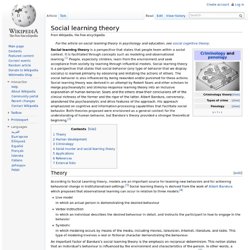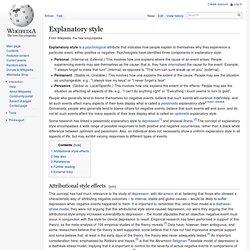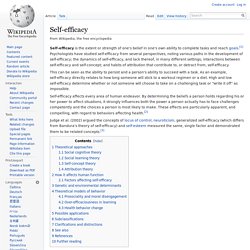

Social learning theory. Is a perspective that states that people learn within a social context.

It is facilitated through concepts such as modeling and observational learning. [ 1 ] [ edit ] Theory According to Social Learning theory, models are an important source for learning new behaviors and for achieving behavioral change in institutionalized settings. [ 2 ] Social learning theory is derived from the work of Albert Bandura which proposed that observational learning can occur in relation to three models: [ 3 ] • Live model – in which an actual person is demonstrating the desired behaviour • Verbal instruction – in which an individual describes the desired behaviour in detail, and instructs the participant in how to engage in the behavior • Symbolic – in which modeling occurs by means of the media, including movies, television, Internet, literature, and radio. An important factor of Bandura’s social learning theory is the emphasis on reciprocal determinism. 1. 2. 3. 4. Walter Mischel.
Walter Mischel (born February 22, 1930) is an American psychologist specializing in personality theory and social psychology.

He is the Robert Johnston Niven Professor of Humane Letters in the Department of Psychology at Columbia University. Early life[edit] Professional career[edit] Mischel taught at the University of Colorado from 1956 to 1958, at Harvard University from 1958 to 1962, and at Stanford University from 1962 to 1983. Since 1983, Mischel has been in the Department of Psychology at Columbia University. Mischel was elected to the National Academy of Sciences in 2004 and to the American Academy of Arts and Sciences in 1991. Explanatory style. Explanatory style is a psychological attribute that indicates how people explain to themselves why they experience a particular event, either positive or negative.

Psychologists have identified three components in explanatory style: Personal. (Internal vs. External.) This involves how one explains where the cause of an event arises. People who generally tend to blame themselves for negative events, believe that such events will continue indefinitely, and let such events affect many aspects of their lives display what is called a pessimistic explanatory style[citation needed]. Some research has linked a pessimistic explanatory style to depression[1] and physical illness.[2] The concept of explanatory style encompasses a wide range of possible responses to both positive and negative occurrences, rather than a black-white difference between optimism and pessimism. Locus of control. In personality psychology, locus of control refers to the extent to which individuals believe that they can control events that affect them.
Understanding of the concept was developed by Julian B. Bobo doll experiment. The Bobo doll experiment was the collective name of the experiments conducted by Albert Bandura in 1961 and 1963 studying children's behavior after watching an adult model act aggressively towards a Bobo doll.

There are different variations of the experiment. The most notable experiment measured the children's behaviour after seeing the model get rewarded, punished or experience no consequence for beating up the bobo doll. This experiment is the empirical demonstration of Bandura's social learning theory. It shows that people not only learn by being rewarded or punished itself (behaviorism), they can learn from watching somebody being rewarded or punished, too (observational learning). These experiments are important because they sparked many more studies on the effects of observational learning and they have practical implication, e.g. how children can be influenced watching violent media.
The Bobo doll[edit] Albert Bandura. Albert Bandura (born December 4, 1925) is a psychologist who is the David Starr Jordan Professor Emeritus of Social Science in Psychology at Stanford University.

For almost six decades, he has been responsible for contributions to many fields of psychology, including social cognitive theory, therapy and personality psychology, and was also influential in the transition between behaviorism and cognitive psychology. He is known as the originator of social learning theory and the theoretical construct of self-efficacy, and is also responsible for the influential 1961 Bobo doll experiment. A 2002 survey ranked Bandura as the fourth most-frequently cited psychologist of all time, behind B. F. Skinner, Sigmund Freud, and Jean Piaget, and as the most cited living one.[1] Bandura is widely described as the greatest living psychologist,[2][3][4][5] and as one of the most influential psychologists of all time.[6][7] Self-efficacy. Self-efficacy is the extent or strength of one's belief in one's own ability to complete tasks and reach goals.[1] Psychologists have studied self-efficacy from several perspectives, noting various paths in the development of self-efficacy; the dynamics of self-efficacy, and lack thereof, in many different settings; interactions between self-efficacy and self-concept; and habits of attribution that contribute to, or detract from, self-efficacy.

This can be seen as the ability to persist and a person's ability to succeed with a task. As an example, self-efficacy directly relates to how long someone will stick to a workout regimen or a diet. High and low self-efficacy determine whether or not someone will choose to take on a challenging task or "write it off" as impossible.